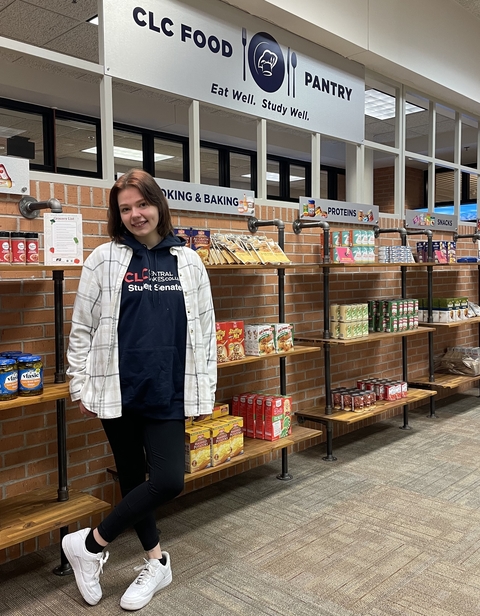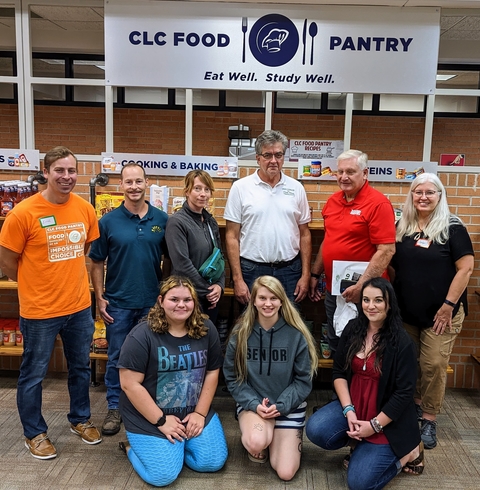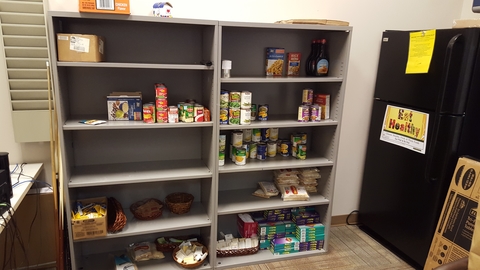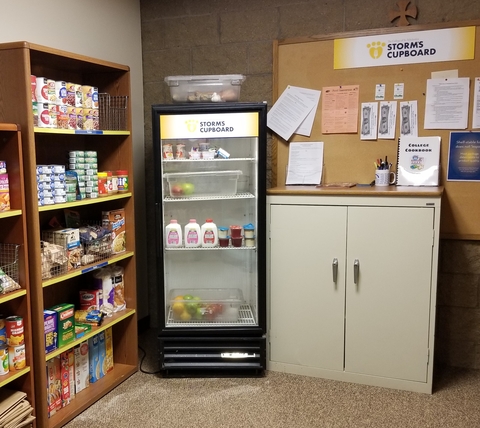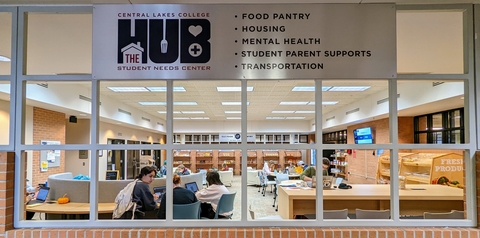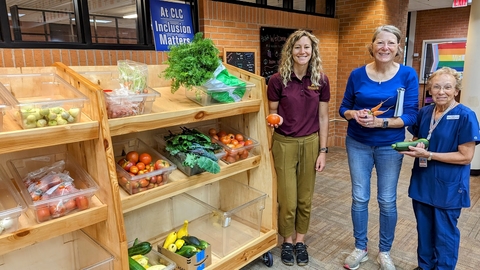Emily Roberts, a Central Lakes College student in Brainerd, was “in a not great living situation” last year. “I was using the campus food shelf almost every day,” she says.
And yet she did not feel judged for that.
Erich Heppner, on the other hand, has memories of feeling so ashamed that he’d take an exam with no food in his belly. This Central Lakes College alumnus is now its director of student life. “This college has long innovated ways to meet student needs, including a food shelf created in the 1970s,” says Heppner. “But it wasn’t a real dignified experience or widely used.”
With the help of student leaders in 2015, Heppner turned the dreary pantry into something that looked more like a mini-mart. Central Lakes College was ahead of its time, but still missed a way to help students choose healthy foods.
Nudging to better health
Carolyn McQueen, University of Minnesota Extension health and wellness coordinator, brought that piece of the puzzle to Central Lakes College with a concept she often uses in SNAP-Ed* called “nudging.”
If it’s ever seemed like apple slices called your name before cookies, you may have been nudged toward better health.
“Carolyn brought the nutrition expertise we needed so students can get that energy they need to get through afternoon classes but also so they can keep on feeling good and ultimately make it to graduation,” says Heppner.
With McQueen’s help, the CLC food pantry went from serving about 200 students a week to over 400.
Roberts, who is now part of a student team that rallies to meet delivery trucks and stock the shelves, has learned the concepts.
“We put the more healthy things — the more essential foods — up front and the more snacky things that are going to get nabbed in the back,” Roberts says. “We’ve seen students take a veggie tray and share it with friends.”
High needs on campus
In 2022, Minnesota’s 400 food shelves had more visits than any other year, at over 5.5 million visits — 1.9 million more than in 2021 — according to Hunger Solutions Minnesota.
College students are not always counted in that number, even though 30% of college students are food insecure, according to the College and University Food Bank Alliance. The Real College Survey puts that number at 37% for Minnesota.
Challenged for staff and space
One challenge is that campus food shelves are usually managed “on the side” by student life coordinators, campus ministers or counselors. Many of them volunteer extra hours to make it happen.
Space is hard to come by. Food shelves often consist of a closet, hallway or a couple of shelving units. Tucking away the food shelf is sometimes a well-intentioned way to respect privacy, but making it almost invisible can backfire and add more stigma.
A new network
Linda Erdahl, a University of Minnesota Extension health and wellness coordinator in St. Louis County, didn't know there was a food shelf at University of Minnesota Duluth until she was invited to donate.
She was curious about whether other colleges and universities also had food shelves.
“I started cold calling other schools, finding out who managed campus food shelves,” says Erdahl.
Her Extension colleague Chris Strand joined her in gathering information. “When we started out, there was not much documented,” he says.
Erdahl and Strand discovered that few managers were connected to networks and resources available to community food shelves.
So, in 2017, Extension educators formed the Northern Campus Food Shelf Network. New efforts resulted in “Nudging to Healthier Choices” training and funding to update space.
Six schools chose to participate. Other schools followed, modeling their food shelves on what they learned from Extension health and wellness coordinators in their area.
Taking a page from the SuperShelf book
Extension health and wellness coordinators like Erdahl, Strand and McQueen work with food shelves across Minnesota to help them group and organize foods differently and showcase healthy and culturally significant options.
That effort comes through a partnership called SuperShelf. The most important aspect of a SuperShelf is respect for an individual’s choices.
Campuses are not official SuperShelfs but can use the same inviting design principles, such as bright signs and lighting. They can also integrate school colors and mascots to bring school spirit to the design, something student interns have helped make happen.
Notable results
College representatives involved in food shelf transformations report that students have noticed the changes, increased food shelf use and are choosing more healthy foods.
Nowadays, at Central Lakes College, the food is displayed in a big commons area called The Hub.
“It’s an open environment where everyone gathers and studies,” says Heppner. “Students see their fellow students making use of the food shelf and it gives them the permission they need to use it themselves.”
“I’ve never seen anyone be, you know, chastised or judged for using it,” says Roberts. “It was like my main hangout spot last year.”
Nourished by the campus garden
A great campus food shelf offers healthy foods in all the food groups. But produce growing right outside the campus door — now that really gets students excited to eat well.
“We encourage students to pop into our courtyard garden when things are ripe enough to pick,” says Erich Heppner, director of student life at Central Lakes College’s Brainerd campus. “It’s pretty cool to see.”
University of Minnesota Extension Master Gardener volunteers, longtime leaders in the schoolyard garden movement, play a powerful role in these campus gardens.
Jennifer Lee is an Extension Master Gardener volunteer in Crow Wing County for the Central Lakes College campus garden.
“She’s convinced some of our faculty members to go through the Master Gardener classes,” adds Heppner. “So now they too are coming alongside us to care for these gardens and keep them in a healthy state.”
Heppner appreciates Lee and the faculty who are new Master Gardeners. “We already have plans to do more raised beds next spring and to grow even more.”
Permission is granted to news media to republish our news articles with credit to University of Minnesota Extension. Images also may be republished; please check for specific photographer credits or limited use restrictions in the photo title.


